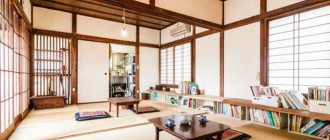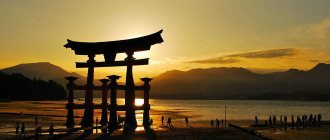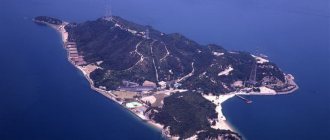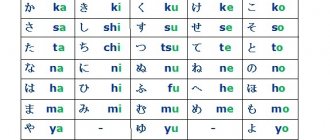Real estate in Japan is considered one of the most expensive in the world. There are objective reasons for this: the minimum amount of free land, catastrophic population density, economic development, and an acute shortage of available housing. But, even despite the impressive prices, the number of potential buyers is huge. These include the Japanese themselves and foreigners, including Russians.
Types of real estate in Japan
As in any other country, the Japanese real estate market is represented by various types of housing to suit every taste (but not every budget). However, it is worth immediately warning that real estate owned by a non-resident does not give him the right to immigrate to Japan.
Among the most common types of real estate on the market:
- Small capsule apartments. Perhaps the cheapest Japanese housing. The area of such one-room apartments is usually no more than 15–20 square meters. m. Suitable as temporary housing for students or foreigners who come to Japan to work. However, the Japanese live in such apartments much more often than foreigners.
- Apartments in new buildings. Apartments from the developer are sold in any, even not the largest city in Japan. The sale of apartments is usually handled by the sales department, which will show potential buyers a short video about the residential complex, describe possible layout options, and even show samples of the materials from which the finishing is made. The new houses have much more luxury housing with 4–7 or more rooms.
- Apartments on the secondary market. There are much more old housing stock than new buildings. Resale housing in Japan is much cheaper than new buildings, but the conditions are appropriate. An inexpensive apartment in an old high-rise building can frighten not only with the summer invasion of parasites, but also with a terrible story - it is possible that someone committed suicide in it.
- Private houses. Japanese private houses are usually built on several floors. But this does not make them mansions - the typical situation is when a three-story house has an area of only 80–120 square meters. m. However, this does not make them uncomfortable: successfully integrated into the local architecture, such houses are popular among residents of the country.
- Condominiums. An alternative and relatively new form of housing in Japan. In fact, these are the same apartments in modern high-rise buildings, where the ownership rights of residents extend not only to the apartments themselves, but also to the common property of the building. Unlike European ones, Japanese condominiums are usually located in high-rise buildings with 20-30 floors. Meeting a 2-3-story condominium is an impossible task.
- Non-residential premises. Commercial real estate in Japan is represented by various types of premises: retail, industrial, catering establishments, warehouses.
Features of the real estate market
The state's limited territory and high population density affect the housing market. Obviously, the main differences will be its high cost and small area.
Primary housing
Japanese developers are striving to find buyers as quickly as possible and begin a new project. There is high competition for the right to develop land plots. Therefore, clients are offered various bonuses and interesting marketing ploys. In the offices of many construction companies, performances are held where people are shown a video presentation of their future home, demonstrating the quality of the material and safety.
To do this, one of the office premises can be decorated as an apartment or even a model of the building can be made in an aquarium and, by supplying water and simulating seismic activity, the structure can be tested for tsunamis and earthquakes. Of course, the developer will organize an on-site inspection of the apartments and will provide various advantages when purchasing outright or through a mortgage.
Secondary market
Such apartments in Japan can be bought for next to nothing. Sellers do not have the right to hide any shortcomings and troubles from the past associated with the apartment. Superstitious Japanese will never agree to live in a room where a murder or suicide has been committed. These are the offers that foreigners should pay attention to, because the discount on a “bad” apartment can be over 50%. If you want to rent a house, you should consider a few more market features.
- In densely populated areas with a small number of apartments for rent, you will have to pay extra for agreeing to renew the contract.
- In new houses, prices are higher than in old buildings (the age of the building is indicated even in advertising offers for rent/purchase).
- You will have to pay extra for the right to keep pets.
The average rental cost varies between 30-170 thousand rubles. The apartment can be purchased at a price starting from $150,000.
Private houses
Traditionally, one chooses from two options. This could be a small wooden mansion with an area of 100 m2 for a reasonable fee. Although many houses in Japan look like works of architecture, they are characterized by unique facade decoration and unusual shape of the premises. The reason for such development is not only the desire to increase the price through artistic solutions. The problem is the high cost of land. Therefore, cottages in Japan are often built in the form of 4x4 meter towers with 3–5 floors.
Commercial real estate
Purchasing premises is a profitable investment in Japan. With an annual turnover of over $35 billion, it is in the top 10 ranking of countries with the most developed real estate market. Usually foreigners invest in office buildings. Such investments pay off the fastest.
How to look for real estate in Japan
As in any other country, the Japanese real estate market is predominantly represented online.
The Japanese also primarily look for apartments on the Internet. But for Russian-speaking buyers, the language barrier turns out to be a big problem. If you read Japanese, the first place to start is to use local real estate websites. Here are a few popular ones from the top Google results:
- .
Google translator does not reproduce Japanese words so correctly that you can freely use these sites without knowing the language. But in any case, it’s worth monitoring them and getting to know the market.
If the Japanese language is still a problem, you should turn to sites that support Russian. These will be properties from international real estate agencies and the information will be presented with restrictions - you will not be able to get contacts of the property owners.
Among such sites with Russian language support:
- is an international agency with about 3.3 thousand facilities throughout Japan. Most of all there are cooperative apartments and private houses for one family.
- – the agency specializes in the sale of luxury private homes, including in Japan. There are not many options presented here, and most often not budget ones.
- – a real estate site for wealthy buyers. Prices for properties in Japan are converted directly into rubles.
We also recommend paying attention to the following resources:
- .
Local newspapers and media advertisements can also be used as search channels. But this option, again, is only suitable for those who know Japanese.
If searching on your own is not at all for you, hire a realtor. And if you are in one of the Japanese cities, advertisements from real estate agencies can be found on special street stands. True, all the information on them is again in Japanese.
In general, there are plenty of real estate agencies in Japan, many of which also work with the European public. Here are some of the best agencies that can help you buy a home in Japan:
- – has been operating in the Japanese market since 1972, has 7 offices in different cities of the country.
- – has offices in 70 countries, operating in Japan since 1997.
- – operates, as a rule, in the Tokyo market, the first office was opened in 1985.
- - has been represented on the Japanese market since 2004, but during this time it has managed to gain credibility.
- is a very large international agency that appeared on the Japanese market only in 2021.
Kitchen in Tokyo
The only difficulty you will have to face in Tokyo in terms of food is that it is extremely difficult to decide what exactly you want! Most Japanese restaurants specialize in a certain type of cuisine, so it's best to decide what you want in advance! Japanese cuisine for the most part is incredibly healthy, wholesome and fresh, and you will be deeply surprised at how healthy the Japanese eat everywhere! For a quick and inexpensive lunch, your best bet in Tokyo is ramen (noodle soup). You'll find ramen everywhere - but remember to make loud slurping noises while eating - it's considered polite! You also can't step foot in Tokyo without running into 'Izakaya', a type of Japanese bar. These restaurant bars serve a variety of small, light dishes that pair well with beer and sake. For sushi lovers, we highly recommend visiting the Tsukiji Fish Market. This market is a rare place in Tokyo that is not crowded with tourists, but with locals. To be able to order the best sushi, it is best to arrive early in the morning.
Housing prices
Real estate prices in Japan differ from region to region, in some places by several times. For example, the highest prices are expected in Tokyo: in 2021, the average price for a new apartment is 60,980,000 yen or 557 thousand dollars. Price per 1 sq. m reaches 931,000 yen or 8.5 thousand dollars.
The article “Prices in Paris in 2021” will tell you that compared to housing prices in the French capital, Tokyo housing is cheaper, and other issues related to real estate.
At the same time, prices differ in different prefectures of Tokyo: in the 23 Wards area prices reach 75 million yen, while in Chiba Prefecture the average price is 43 million, which is significantly lower than the average in the capital. And prices for apartments in the city center can easily reach 119 million yen ($1.1 million).
In Osaka, prices are slightly lower: 1 sq. m of housing in the city center costs 515 thousand yen (4.8 thousand dollars). This means that on average a standard apartment of 60 square meters. m will cost about 300–400 thousand dollars in the city.
Prices are similar in Kyoto: the average price per square meter is 575 thousand yen or 5.3 thousand dollars. A standard apartment will cost at least 350 thousand dollars, and this is not in the center.
Nagoya is a city between Tokyo and Osaka, therefore it is very convenient for a comfortable stay. Housing prices are relatively low here compared to other large settlements: the average cost of housing is 317 thousand yen/sq. m. A standard apartment will cost 20–25 million yen (190–230 thousand dollars).
Popular with foreigners, Yokohama is the largest port city. Housing prices here are significantly lower than in major centers such as Tokyo and Osaka. So, if you buy through a local agency, depending on the area, the apartment will cost 15–30 million yen ($130–280 thousand).
The spread of real estate prices in Japan is comparable to the cost of housing in China, as evidenced by the material in the article “Real Estate in the People's Republic of China.”
He will also provide guidance on prices for real estate transactions.
Tokyo: Rent Apartments & Apartments or Other Accommodation
How much does life cost in Togliatti?
The breathtaking and ever-growing Japanese metropolis of Tokyo definitely has something to show off to tourists. The city is the capital of Japan and is home to the Japanese government and the Imperial Palace. The city's population is 13 million people, and its area stretches as far as the eye can see. In 2009, Tokyo was voted the best city to live in due to its high standard of living. In Tokyo you can find accommodation for absolutely every taste and income, from exclusive hotels to cheap hostels. HomeToGo offers a variety of affordable rentals, from city center penthouses and studios to traditional Japanese homes and guest rooms. Find your ideal accommodation in Tokyo with HomeToGo!
Procedure for purchasing a home
Now that you've figured out how much it costs to buy a house in Japan, it's time to figure out how to buy it. Let us immediately note that there are no legal obstacles to the purchase of housing by foreigners in Japan: to buy a house, there is no need to obtain citizenship, a residence permit or even a visa. Accordingly, a non-resident does not receive the right to immigrate to Japan on the basis of real estate owned by him.
The article “How to obtain citizenship in Japan” will tell you about the procedure for obtaining citizenship status, the timing and cost.
There are also no restrictions on land ownership.
But this does not mean that buying real estate in Japan for a non-resident will not be difficult. It will definitely include several steps, including:
- Collecting money. In Japan, it is common to buy housing with a mortgage. But for non-residents this way of financing is closed - loans are given to foreigners reluctantly, and even then only to those who live in Japan. Guidelines on obtaining a loan for foreigners can be obtained. So if you can’t count on it, you’ll have to save up.
- Selection of options. Price comparison, inspection of offers on site. At this stage, it is important to look through as many options as possible in order to get the most objective idea of prices.
- Preliminary conclusion of the contract. If you intend to buy an apartment in a new building, you need to fill out and submit a purchase application (kounyuu moshikomisho). Be prepared that you will not be the only potential buyer and that there will be an auction. If this is a secondary home, the potential buyer sends the owner a letter of intent - this will serve as a starting point for negotiations.
- If you are ready to buy, make a down payment (tetsukekin). Usually it is done in the amount of 5–10% of the transaction amount.
- The buyer then receives what is known as a Questions Guide, a legal document of 10 to 100 pages that describes all the possible questions the buyer may have and intends to ask the seller about the property being purchased. The significance of this document is to eliminate further possible disputes between the parties to the transaction - all possible issues are explained in the manual. It is issued to ensure that the buyer has sufficient information before signing a legally binding purchase agreement.
- Signing the purchase and sale agreement. Additionally, you should make sure that the contract includes all the points that were agreed upon with the seller.
- Payment of the remaining amount of the redemption price, re-registration of ownership.
Please note: if the purchase is made in the middle of the year, you must also stipulate that the seller will pay a portion of the property taxes that corresponds to the number of days he owned the property before selling it. The cost of the final transaction can be reduced by the same amount.
Drawing up a purchase and sale agreement
The contract is the main document of title for real estate in Japan. It is drawn up exclusively in Japanese in the presence of a notary, therefore, when drawing it up, it is important to have the participation of the buyer’s personal accredited translator, who will explain to him the essence and content of the contract. Also, when signing, there is usually a real estate broker present who accompanies the transaction.
The contract is sent to the buyer in advance so that he can familiarize himself with its text in a language he understands. Moreover, if there are discrepancies or contradictions in the text of the agreement in different languages, the document in Japanese has priority.
When all questions are clarified and the buyer approves the purchase, both parties sign the contract, putting a personal seal (facsimile) on their name, written in hieroglyphs.
The case is then assigned to a lawyer who will handle the preparation of real estate certificates and the re-registration of title to the buyer with the Bureau of Legal Affairs. From the moment of registration in the real estate register (toukibo), the buyer becomes the full owner and can freely dispose of the property.
Documents for registration
To draw up a purchase and sale agreement, the buyer will need a minimum package of documents:
- international passport;
- seal;
- affidavit (written statement) of the present witness;
- Bank details;
- tax number. The tax authority requires non-residents who own real estate in Japan to appoint a resident as their tax administrator. These functions can be performed either by a Japanese friend or by a hired lawyer.
Mortgage
Foreigners and local residents most often purchase real estate in installments. A mortgage in Japan for an immigrant is issued under the following conditions:
- obtaining a residence permit;
- stay in Japan for at least 5 years;
- 5 years of work experience;
- knowledge of Japanese;
- registering a marriage with a Japanese man
- grounds for long-term residence in Japan (study, work, etc.).
Mortgages are usually issued for 50 years. In the event of the death of the debtor, another half century is added to the remaining term so that the heirs have time to pay the bank. 10% of the cost must be paid as a down payment.
Features of choosing a bank
The country's system of credit institutions is based on financial institutions at the national level. The share of these banks covers 80% of the total capital. Smaller ones are regional institutions (I and II levels), as well as city financial organizations. They are the ones who offer the most favorable mortgage conditions.
List of documents
To approve a loan, you will need the following evidence:
- identification;
- credit history;
- income certificate;
- a similar document filled out according to the form provided by the bank.
Typically, the review period does not exceed a business week, after which the applicant is notified of acceptance or refusal of the loan.
Costs when purchasing real estate
The redemption value is not all the money that the buyer will have to pay when registering the property. The list of mandatory expenses when purchasing Japanese real estate will necessarily include:
- Tax on the acquisition of real estate - is paid from each transaction for the resale of the same property and is 4% of the transaction amount.
- Registration license tax (state fee for re-registration) – depends on the type of registration. For example, initial registration (new housing, inheritance) is carried out at a rate of 0.4% of the cost of housing, when purchasing from the owner - 2% of the transaction.
- Stamp duty – 500 thousand yen.
- Broker's commission is usually 3% of the transaction amount + 60 thousand yen.
- Property tax and urban planning tax - levied on each property owner annually on January 1 at rates of 1.4 and 0.3%, respectively (of the assessed value of the property).
You will be introduced to real estate taxes and other types of payments in the article “Tax system in Japan: levels, obligations and benefits.”
In addition to these mandatory expenses, a buyer from the CIS countries will have to spend money on the services of a translator, notary and lawyer to re-register real estate in the Japanese state registers.
Finding suitable housing
If a foreigner comes to Japan for a long time, then it will be in his interests to rent an apartment as quickly as possible. This way he can save on hotel fees and food. If a person is fluent in Japanese, then the search for suitable housing can begin on their own. But if communication with local citizens is limited to phrases in English, then you cannot do without the help of intermediaries.
On one's own
As in Russia, looking for an apartment without involving a realtor or agency in Japan is theoretically more profitable. But an independent search for housing in this country is limited only to rooms, payment for which is made informally, by transferring cash. Renting apartments almost always requires the conclusion of a formal contract. Therefore, for legal support of the transaction, people turn to a real estate agency.
You can try to find an apartment by looking at specialized websites and newspapers. In Tokyo and other large cities, advertisements for housing rentals are also placed on special boards near subway exits and near commuter train platforms. However, such advertisements are almost always posted by the agencies themselves.
Using sites
Using Internet resources to search for an apartment or house is much more convenient than viewing advertisements near the train station. After all, here you can use filters based on various parameters: price, number of rooms, area, floor, etc. In addition, the housing base on rental and real estate sites is many times larger than on any paper bulletin board.
Online resources for selling apartments and houses are divided into two types. Some of them are ad aggregators that post information and photos provided by agencies or homeowners. The second type is the sites of realtors working exclusively from their own database.
Through a real estate agency
Foreigners who come to Japan for the first time have a vague understanding of local laws. Therefore, to rent or buy an apartment, it is better for them to use the help of an intermediary - a realtor or agency.
There are many firms in Japan that provide legal support for rental or purchase transactions. There are several hundred of them in Tokyo alone. Some of the agencies work with their own real estate database, others search for tenants or buyers using a general catalog of premises, receiving interest from each concluded contract.
Finding an apartment in Japan has characteristic features that you will not find in Russia or some other countries. For example, when contacting an agency, a foreigner will always be asked whether he has a guarantor - a Japanese citizen who is ready to vouch for him. The amount of rent and the rental period are not so important - the owner needs to be sure that in the event of damage, someone will compensate them. After all, if a foreigner leaves Japan, in the absence of a guarantor, it will be almost impossible to recover losses.
To solve this problem, there are special surety companies in large cities. They provide foreign citizens who want to rent housing with guarantor services for a certain amount. It usually ranges from 10 to 30 thousand yen (90-270 US dollars). In addition to the cost of rent for the first month and payment of the guarantor, the future tenant will have to provide the owner of the apartment with a cash deposit.
There are no such problems when purchasing a property. Here you just need to take care of the legal purity of the transaction. Considering that apartments and houses in Japan are very expensive, in order to avoid misunderstandings, many buyers and sellers of real estate prefer to deal with large network agencies that have branches in almost every prefecture.
Tips for buying property in Japan
When buying Japanese real estate, local agents advise foreigners:
- To save money when buying a residential building, give preference to those located on rented land plots - they cost almost half the cost of a house with land.
- Give preference to local brokers working with CIS citizens rather than Russian-speaking intermediaries - the services of the former will cost much less.
- If you are unable to attend the transaction yourself and purchasing a home is purely an investment, enter into an agreement with a local real estate agency for representation. They will not only find an apartment and conduct a transaction, but will also manage the property in your interests.
- Choose housing in residential areas - it costs much less, but the dynamics of price growth exceeds the dynamics in the center of large cities.
Where can I find housing to buy?
There are several ways to buy a home: using a realtor, buying online or directly from the developer.
Search on the Internet
There are not many Russian-language sites on which you can view a real estate catalog.
The luxuryestate portal contains more than 350 thousand options for selling real estate not only in Japan. The resource contains only luxury apartments. When choosing the Russian language, the cost is automatically converted into national currency.
Sotheby's is a popular portal sothebysrealty.com for purchasing expensive real estate.
There are several classes of real estate on the website world-real-estate.ru. Here you can buy everything from a utility room to an apartment in Japan.
Real estate agency
Agency help is the most thoughtful and justified decision. The procedure for purchasing apartments in other countries has many nuances that are not so easy for an inexperienced foreigner to understand. In addition, it is worth scrupulously approaching the drafting of the text of the contract. The agent takes into account desires, budget and offers the client the most profitable options.
Independent search
Advertisements for the sale of potential options cannot be found in newspapers. You can search for options on the specialized portals listed above. However, the procedure is distinguished by its nuances: the chance of contacting the apartment owner directly is almost zero. Typically, the Japanese prefer to entrust the sale of their real estate to an agency in order to save themselves from the problems of drawing up and signing a contract. Therefore, it is better to entrust this to professionals.










